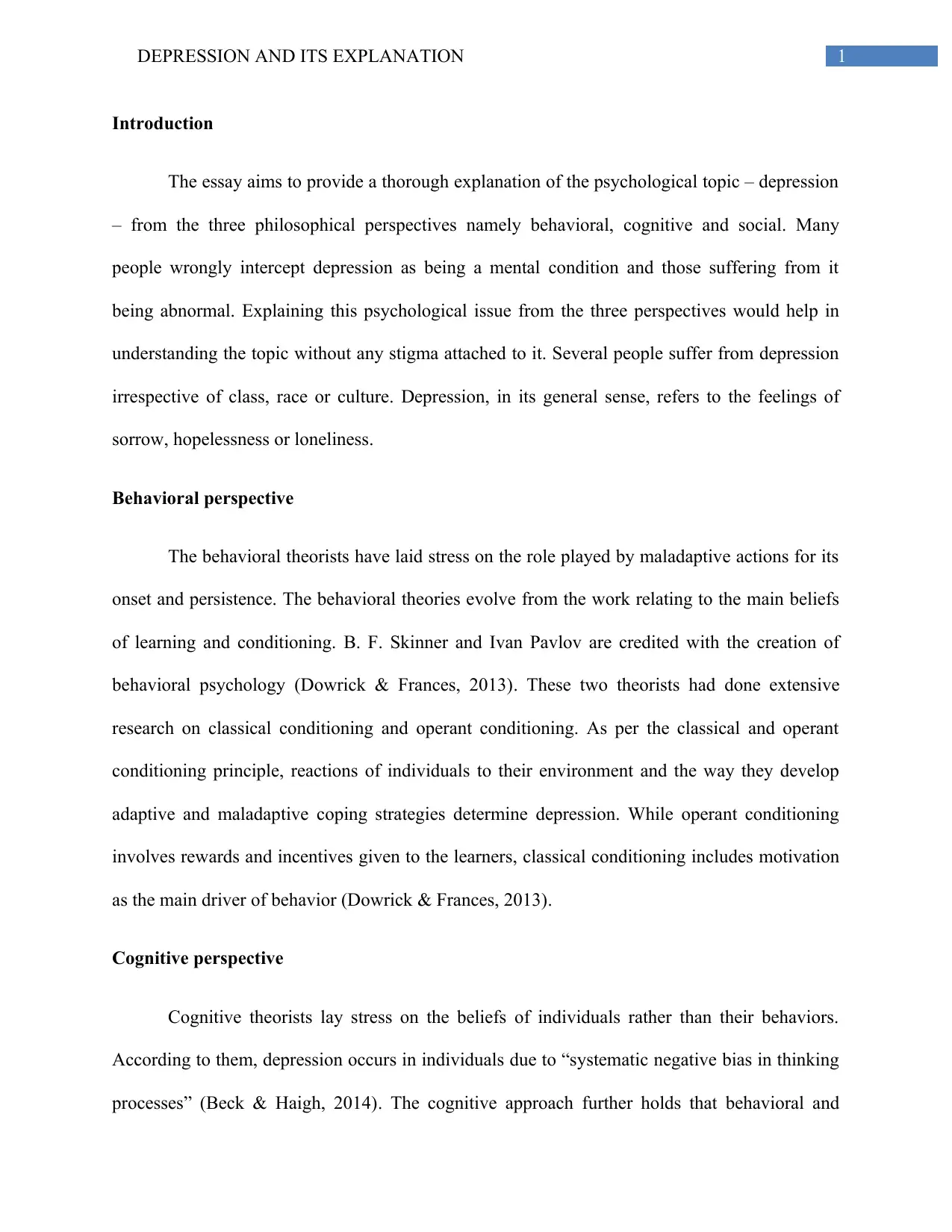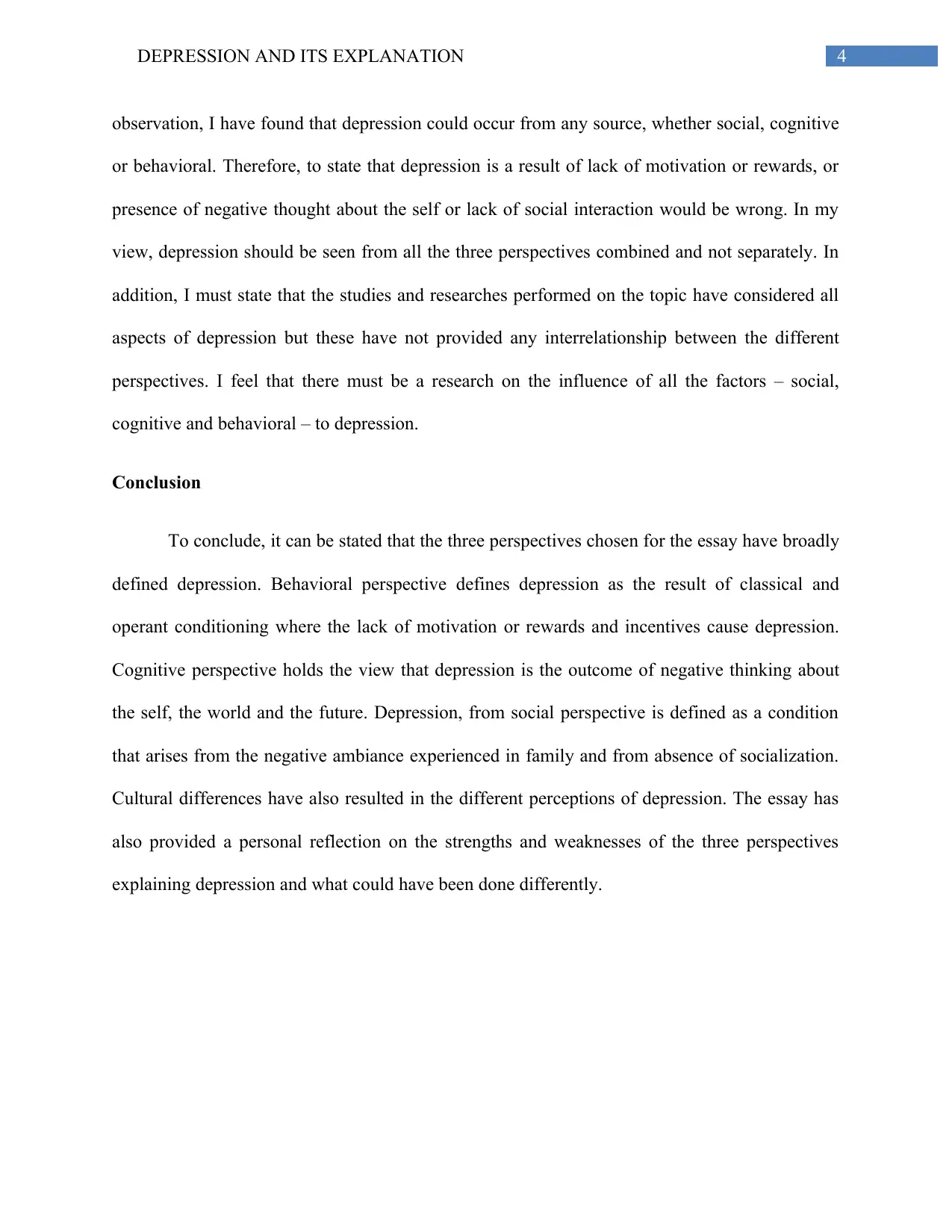PSYCH 105 - Fall 2018: Exploring Depression's Perspectives
VerifiedAdded on 2023/06/04
|6
|1565
|357
Essay
AI Summary
This essay provides a comprehensive exploration of depression, examining it through three distinct psychological perspectives: behavioral, cognitive, and social. The behavioral perspective emphasizes the role of maladaptive behaviors and conditioning, drawing upon the work of Skinner and Pavlov. The cognitive perspective highlights the impact of negative thinking patterns and cognitive biases, with a focus on the theories of Aaron Beck. The social perspective connects depression to disturbances within an individual's social environment, including family dynamics, cultural influences, and gender roles. The essay analyzes the strengths and weaknesses of each perspective, and concludes that depression is best understood by integrating these perspectives rather than considering them in isolation. It emphasizes the importance of considering individual circumstances when understanding depression and suggests that further research should explore the interplay of social, cognitive, and behavioral factors.

Running head: DEPRESSION AND ITS EXPLANATION
DEPRESSION AND ITS EXPLANATION
Name of the student
Name of the university
Author note
DEPRESSION AND ITS EXPLANATION
Name of the student
Name of the university
Author note
Paraphrase This Document
Need a fresh take? Get an instant paraphrase of this document with our AI Paraphraser

1DEPRESSION AND ITS EXPLANATION
Introduction
The essay aims to provide a thorough explanation of the psychological topic – depression
– from the three philosophical perspectives namely behavioral, cognitive and social. Many
people wrongly intercept depression as being a mental condition and those suffering from it
being abnormal. Explaining this psychological issue from the three perspectives would help in
understanding the topic without any stigma attached to it. Several people suffer from depression
irrespective of class, race or culture. Depression, in its general sense, refers to the feelings of
sorrow, hopelessness or loneliness.
Behavioral perspective
The behavioral theorists have laid stress on the role played by maladaptive actions for its
onset and persistence. The behavioral theories evolve from the work relating to the main beliefs
of learning and conditioning. B. F. Skinner and Ivan Pavlov are credited with the creation of
behavioral psychology (Dowrick & Frances, 2013). These two theorists had done extensive
research on classical conditioning and operant conditioning. As per the classical and operant
conditioning principle, reactions of individuals to their environment and the way they develop
adaptive and maladaptive coping strategies determine depression. While operant conditioning
involves rewards and incentives given to the learners, classical conditioning includes motivation
as the main driver of behavior (Dowrick & Frances, 2013).
Cognitive perspective
Cognitive theorists lay stress on the beliefs of individuals rather than their behaviors.
According to them, depression occurs in individuals due to “systematic negative bias in thinking
processes” (Beck & Haigh, 2014). The cognitive approach further holds that behavioral and
Introduction
The essay aims to provide a thorough explanation of the psychological topic – depression
– from the three philosophical perspectives namely behavioral, cognitive and social. Many
people wrongly intercept depression as being a mental condition and those suffering from it
being abnormal. Explaining this psychological issue from the three perspectives would help in
understanding the topic without any stigma attached to it. Several people suffer from depression
irrespective of class, race or culture. Depression, in its general sense, refers to the feelings of
sorrow, hopelessness or loneliness.
Behavioral perspective
The behavioral theorists have laid stress on the role played by maladaptive actions for its
onset and persistence. The behavioral theories evolve from the work relating to the main beliefs
of learning and conditioning. B. F. Skinner and Ivan Pavlov are credited with the creation of
behavioral psychology (Dowrick & Frances, 2013). These two theorists had done extensive
research on classical conditioning and operant conditioning. As per the classical and operant
conditioning principle, reactions of individuals to their environment and the way they develop
adaptive and maladaptive coping strategies determine depression. While operant conditioning
involves rewards and incentives given to the learners, classical conditioning includes motivation
as the main driver of behavior (Dowrick & Frances, 2013).
Cognitive perspective
Cognitive theorists lay stress on the beliefs of individuals rather than their behaviors.
According to them, depression occurs in individuals due to “systematic negative bias in thinking
processes” (Beck & Haigh, 2014). The cognitive approach further holds that behavioral and

2DEPRESSION AND ITS EXPLANATION
emotional symptoms of depression also result from cognitive deformity. In simple words,
patients with depression think differently from normal people as per clinical conditions. Aaron
Beck was a major cognitive theorist who believed that depression was a result of negative
automatic thinking, negative schemas about the self and faulty processing of information (Beck
& Haigh, 2014). Negative thinking about the self, the world and the future is a typical condition
of a depressed person. The negative self-schema refers to the depressed individual’s belief that is
mostly pessimistic. Due to this negative self-schema, people often make logical errors and
become obsessed with only one aspect of a situation while ignoring other equally significant
factors.
Social perspective
The social theorists associate depression with the disturbances in their social
environment. The main factors that contribute to depression, according to social theorists include
family, socialization, culture and gender. According to the sociologists, people become
depressed due to the ambiance they experience in their family; it might be because of a spouse,
parents or any other family members. (Hames, Hagan & Joiner, 2013). The sociologists view
depression as a reason of imbalance in the social environment of the individual. Lack of
socialization has also been a major contributor to depression, as per the social theorists. Studies
in the cultural effects of depression have shown that depression is defined and perceived
differently in different cultures. While most people associate depression with the Western way of
living, several studies have proved otherwise. To give an instance, Indians associate any distress
disorder with depression and Japanese on the other hand consider it as unacceptable. Gender too
has a role to play in depression, believe the social theorists. Gender roles that are preset in certain
emotional symptoms of depression also result from cognitive deformity. In simple words,
patients with depression think differently from normal people as per clinical conditions. Aaron
Beck was a major cognitive theorist who believed that depression was a result of negative
automatic thinking, negative schemas about the self and faulty processing of information (Beck
& Haigh, 2014). Negative thinking about the self, the world and the future is a typical condition
of a depressed person. The negative self-schema refers to the depressed individual’s belief that is
mostly pessimistic. Due to this negative self-schema, people often make logical errors and
become obsessed with only one aspect of a situation while ignoring other equally significant
factors.
Social perspective
The social theorists associate depression with the disturbances in their social
environment. The main factors that contribute to depression, according to social theorists include
family, socialization, culture and gender. According to the sociologists, people become
depressed due to the ambiance they experience in their family; it might be because of a spouse,
parents or any other family members. (Hames, Hagan & Joiner, 2013). The sociologists view
depression as a reason of imbalance in the social environment of the individual. Lack of
socialization has also been a major contributor to depression, as per the social theorists. Studies
in the cultural effects of depression have shown that depression is defined and perceived
differently in different cultures. While most people associate depression with the Western way of
living, several studies have proved otherwise. To give an instance, Indians associate any distress
disorder with depression and Japanese on the other hand consider it as unacceptable. Gender too
has a role to play in depression, believe the social theorists. Gender roles that are preset in certain
⊘ This is a preview!⊘
Do you want full access?
Subscribe today to unlock all pages.

Trusted by 1+ million students worldwide

3DEPRESSION AND ITS EXPLANATION
cultures could give way to depression as the death of a spouse of any gender would ultimately
make the opposite gender depressed as he or she will have to perform both roles.
Analyzing the three perspectives
As evident from the above discussion, the three different perspectives explain depression
in three different ways. Although the primary nature of depression is similar in the three
perspectives, the causes and reasons are contradictory. As Nesi and Prinstein (2015) observes,
the main difference between social and behavioral theory explaining depression is the focus on
human behavior and social interaction. In the contemporary age, explain the authors, the
influence of social media has made depression associated with both social and behavior theory.
In such cases, the behavior of an individual to engage more in the virtual world causes social
isolation and consequently depression. Feinstein et al. (2013) on the other hand, find
contradictions in the explanation of depression from the cognitive and behavioral perspective.
They state that while the behaviorists emphasized lack of motivation, rewards and incentives as
the chief cause of depression, cognitive theorists associated depression with the thinking process.
Slavich and Irwin (2014) further distinguish the three perspectives on depression stating
that these theories were proposed at different eras. Those eras were marked by the prevalence of
social, cognitive and behavioral studies of humans. While on the other hand, Hayes et al. (2013)
remark that with time, these theories became interrelated, which could be evident from the
treatments such as the Cognitive Behavioral Therapy (CBT) that integrates the two theories.
Personal reflection
After analyzing all the perspectives including the differences between them, it is clearly
visible to me that depression is best defined as per the condition of the affected individual. In my
cultures could give way to depression as the death of a spouse of any gender would ultimately
make the opposite gender depressed as he or she will have to perform both roles.
Analyzing the three perspectives
As evident from the above discussion, the three different perspectives explain depression
in three different ways. Although the primary nature of depression is similar in the three
perspectives, the causes and reasons are contradictory. As Nesi and Prinstein (2015) observes,
the main difference between social and behavioral theory explaining depression is the focus on
human behavior and social interaction. In the contemporary age, explain the authors, the
influence of social media has made depression associated with both social and behavior theory.
In such cases, the behavior of an individual to engage more in the virtual world causes social
isolation and consequently depression. Feinstein et al. (2013) on the other hand, find
contradictions in the explanation of depression from the cognitive and behavioral perspective.
They state that while the behaviorists emphasized lack of motivation, rewards and incentives as
the chief cause of depression, cognitive theorists associated depression with the thinking process.
Slavich and Irwin (2014) further distinguish the three perspectives on depression stating
that these theories were proposed at different eras. Those eras were marked by the prevalence of
social, cognitive and behavioral studies of humans. While on the other hand, Hayes et al. (2013)
remark that with time, these theories became interrelated, which could be evident from the
treatments such as the Cognitive Behavioral Therapy (CBT) that integrates the two theories.
Personal reflection
After analyzing all the perspectives including the differences between them, it is clearly
visible to me that depression is best defined as per the condition of the affected individual. In my
Paraphrase This Document
Need a fresh take? Get an instant paraphrase of this document with our AI Paraphraser

4DEPRESSION AND ITS EXPLANATION
observation, I have found that depression could occur from any source, whether social, cognitive
or behavioral. Therefore, to state that depression is a result of lack of motivation or rewards, or
presence of negative thought about the self or lack of social interaction would be wrong. In my
view, depression should be seen from all the three perspectives combined and not separately. In
addition, I must state that the studies and researches performed on the topic have considered all
aspects of depression but these have not provided any interrelationship between the different
perspectives. I feel that there must be a research on the influence of all the factors – social,
cognitive and behavioral – to depression.
Conclusion
To conclude, it can be stated that the three perspectives chosen for the essay have broadly
defined depression. Behavioral perspective defines depression as the result of classical and
operant conditioning where the lack of motivation or rewards and incentives cause depression.
Cognitive perspective holds the view that depression is the outcome of negative thinking about
the self, the world and the future. Depression, from social perspective is defined as a condition
that arises from the negative ambiance experienced in family and from absence of socialization.
Cultural differences have also resulted in the different perceptions of depression. The essay has
also provided a personal reflection on the strengths and weaknesses of the three perspectives
explaining depression and what could have been done differently.
observation, I have found that depression could occur from any source, whether social, cognitive
or behavioral. Therefore, to state that depression is a result of lack of motivation or rewards, or
presence of negative thought about the self or lack of social interaction would be wrong. In my
view, depression should be seen from all the three perspectives combined and not separately. In
addition, I must state that the studies and researches performed on the topic have considered all
aspects of depression but these have not provided any interrelationship between the different
perspectives. I feel that there must be a research on the influence of all the factors – social,
cognitive and behavioral – to depression.
Conclusion
To conclude, it can be stated that the three perspectives chosen for the essay have broadly
defined depression. Behavioral perspective defines depression as the result of classical and
operant conditioning where the lack of motivation or rewards and incentives cause depression.
Cognitive perspective holds the view that depression is the outcome of negative thinking about
the self, the world and the future. Depression, from social perspective is defined as a condition
that arises from the negative ambiance experienced in family and from absence of socialization.
Cultural differences have also resulted in the different perceptions of depression. The essay has
also provided a personal reflection on the strengths and weaknesses of the three perspectives
explaining depression and what could have been done differently.

5DEPRESSION AND ITS EXPLANATION
References:
Beck, A. T., & Haigh, E. A. (2014). Advances in cognitive theory and therapy: the generic
cognitive model. Annual review of clinical psychology, 10, 1-24.
Dowrick, C., & Frances, A. (2013). Medicalising unhappiness: new classification of depression
risks more patients being put on drug treatment from which they will not benefit. BMJ:
British Medical Journal (Online), 347.
Feinstein, B. A., Hershenberg, R., Bhatia, V., Latack, J. A., Meuwly, N., & Davila, J. (2013).
Negative social comparison on Facebook and depressive symptoms: Rumination as a
mechanism. Psychology of Popular Media Culture, 2(3), 161.
Hames, J. L., Hagan, C. R., & Joiner, T. E. (2013). Interpersonal processes in depression. Annual
review of clinical psychology, 9, 355-377.
Hayes, S. C., Levin, M. E., Plumb-Vilardaga, J., Villatte, J. L., & Pistorello, J. (2013).
Acceptance and commitment therapy and contextual behavioral science: Examining the
progress of a distinctive model of behavioral and cognitive therapy. Behavior
therapy, 44(2), 180-198.
Nesi, J., & Prinstein, M. J. (2015). Using social media for social comparison and feedback-
seeking: gender and popularity moderate associations with depressive symptoms. Journal
of abnormal child psychology, 43(8), 1427-1438.
Slavich, G. M., & Irwin, M. R. (2014). From stress to inflammation and major depressive
disorder: a social signal transduction theory of depression. Psychological bulletin, 140(3),
774.
References:
Beck, A. T., & Haigh, E. A. (2014). Advances in cognitive theory and therapy: the generic
cognitive model. Annual review of clinical psychology, 10, 1-24.
Dowrick, C., & Frances, A. (2013). Medicalising unhappiness: new classification of depression
risks more patients being put on drug treatment from which they will not benefit. BMJ:
British Medical Journal (Online), 347.
Feinstein, B. A., Hershenberg, R., Bhatia, V., Latack, J. A., Meuwly, N., & Davila, J. (2013).
Negative social comparison on Facebook and depressive symptoms: Rumination as a
mechanism. Psychology of Popular Media Culture, 2(3), 161.
Hames, J. L., Hagan, C. R., & Joiner, T. E. (2013). Interpersonal processes in depression. Annual
review of clinical psychology, 9, 355-377.
Hayes, S. C., Levin, M. E., Plumb-Vilardaga, J., Villatte, J. L., & Pistorello, J. (2013).
Acceptance and commitment therapy and contextual behavioral science: Examining the
progress of a distinctive model of behavioral and cognitive therapy. Behavior
therapy, 44(2), 180-198.
Nesi, J., & Prinstein, M. J. (2015). Using social media for social comparison and feedback-
seeking: gender and popularity moderate associations with depressive symptoms. Journal
of abnormal child psychology, 43(8), 1427-1438.
Slavich, G. M., & Irwin, M. R. (2014). From stress to inflammation and major depressive
disorder: a social signal transduction theory of depression. Psychological bulletin, 140(3),
774.
⊘ This is a preview!⊘
Do you want full access?
Subscribe today to unlock all pages.

Trusted by 1+ million students worldwide
1 out of 6
Related Documents
Your All-in-One AI-Powered Toolkit for Academic Success.
+13062052269
info@desklib.com
Available 24*7 on WhatsApp / Email
![[object Object]](/_next/static/media/star-bottom.7253800d.svg)
Unlock your academic potential
Copyright © 2020–2026 A2Z Services. All Rights Reserved. Developed and managed by ZUCOL.




